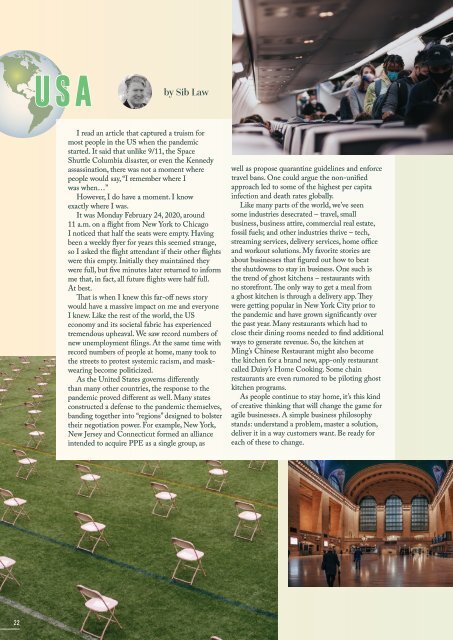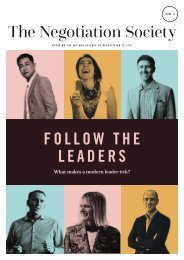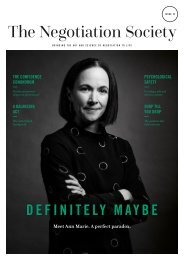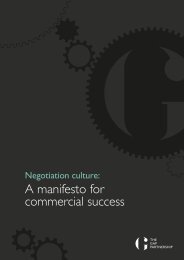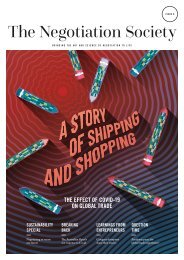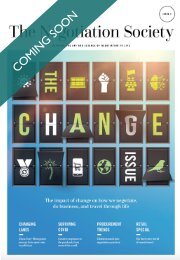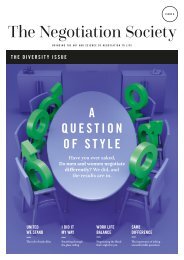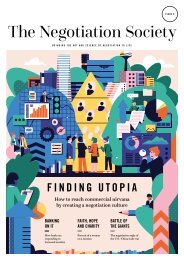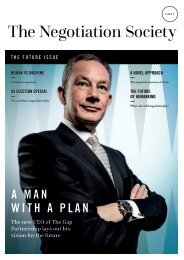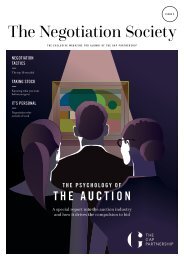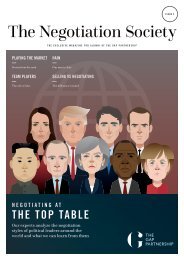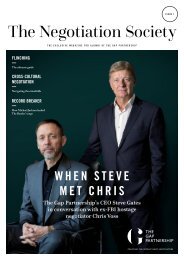The-Negotiation-Society-Magazine-The-Change-Issue
You also want an ePaper? Increase the reach of your titles
YUMPU automatically turns print PDFs into web optimized ePapers that Google loves.
USA<br />
by Sib Law<br />
I read an article that captured a truism for<br />
most people in the US when the pandemic<br />
started. It said that unlike 9/11, the Space<br />
Shuttle Columbia disaster, or even the Kennedy<br />
assassination, there was not a moment where<br />
people would say, “I remember where I<br />
was when…”<br />
However, I do have a moment. I know<br />
exactly where I was.<br />
It was Monday February 24, 2020, around<br />
11 a.m. on a flight from New York to Chicago<br />
I noticed that half the seats were empty. Having<br />
been a weekly flyer for years this seemed strange,<br />
so I asked the flight attendant if their other flights<br />
were this empty. Initially they maintained they<br />
were full, but five minutes later returned to inform<br />
me that, in fact, all future flights were half full.<br />
At best.<br />
That is when I knew this far-off news story<br />
would have a massive impact on me and everyone<br />
I knew. Like the rest of the world, the US<br />
economy and its societal fabric has experienced<br />
tremendous upheaval. We saw record numbers of<br />
new unemployment filings. At the same time with<br />
record numbers of people at home, many took to<br />
the streets to protest systemic racism, and maskwearing<br />
become politicized.<br />
As the United States governs differently<br />
than many other countries, the response to the<br />
pandemic proved different as well. Many states<br />
constructed a defense to the pandemic themselves,<br />
banding together into “regions” designed to bolster<br />
their negotiation power. For example, New York,<br />
New Jersey and Connecticut formed an alliance<br />
intended to acquire PPE as a single group, as<br />
well as propose quarantine guidelines and enforce<br />
travel bans. One could argue the non-unified<br />
approach led to some of the highest per capita<br />
infection and death rates globally.<br />
Like many parts of the world, we’ve seen<br />
some industries desecrated – travel, small<br />
business, business attire, commercial real estate,<br />
fossil fuels; and other industries thrive – tech,<br />
streaming services, delivery services, home office<br />
and workout solutions. My favorite stories are<br />
about businesses that figured out how to beat<br />
the shutdowns to stay in business. One such is<br />
the trend of ghost kitchens – restaurants with<br />
no storefront. <strong>The</strong> only way to get a meal from<br />
a ghost kitchen is through a delivery app. <strong>The</strong>y<br />
were getting popular in New York City prior to<br />
the pandemic and have grown significantly over<br />
the past year. Many restaurants which had to<br />
close their dining rooms needed to find additional<br />
ways to generate revenue. So, the kitchen at<br />
Ming’s Chinese Restaurant might also become<br />
the kitchen for a brand new, app-only restaurant<br />
called Daisy’s Home Cooking. Some chain<br />
restaurants are even rumored to be piloting ghost<br />
kitchen programs.<br />
As people continue to stay home, it’s this kind<br />
of creative thinking that will change the game for<br />
agile businesses. A simple business philosophy<br />
stands: understand a problem, master a solution,<br />
deliver it in a way customers want. Be ready for<br />
each of these to change.<br />
22


